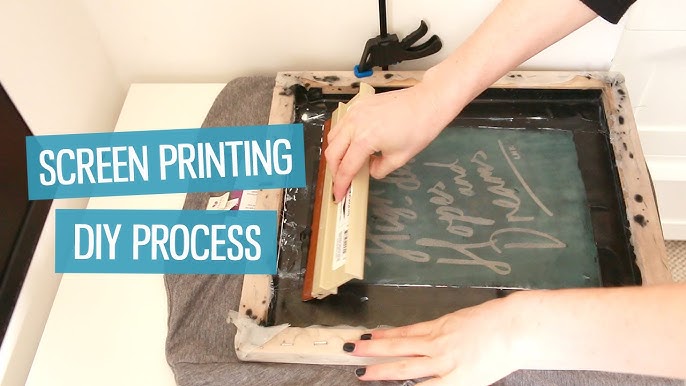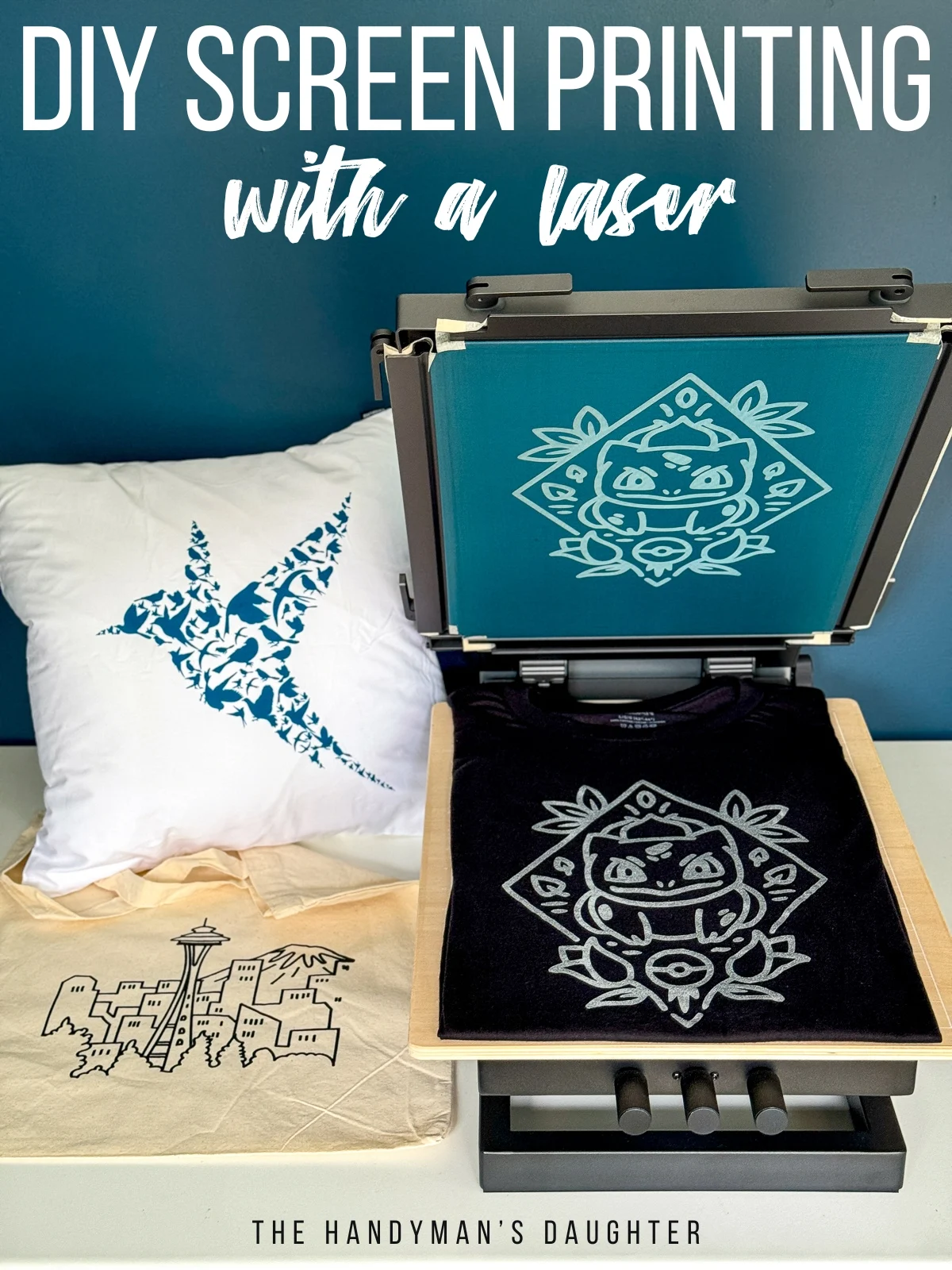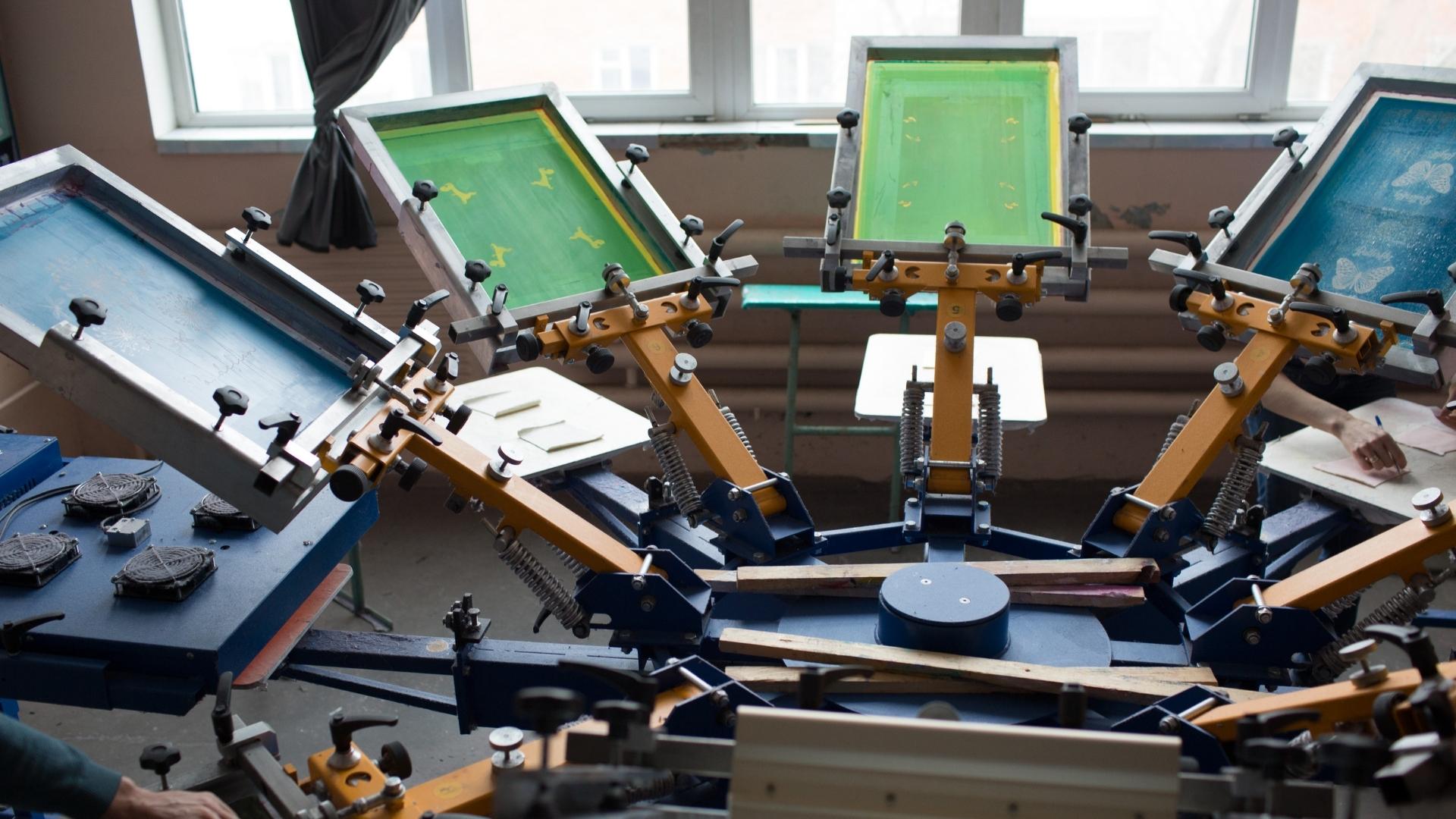Discover the Numerous Kinds Of Screen Printing Techniques for Your Following Project
Screen printing uses a varied range of methods that can boost any creative job. From traditional techniques like serigraphy to modern-day technologies such as direct-to-garment printing, each strategy has its distinct advantages. Specialized alternatives, including metallic and environment-friendly inks, present much more opportunities. Understanding these methods can substantially affect the final end result. Nevertheless, the difficulty lies in picking one of the most ideal technique for details requirements and preferred results. What aspects should one consider?

The Essentials of Screen Printing
Screen printing might seem facility, it is basically a simple process that entails moving ink with a mesh screen onto various surface areas. The method starts with the creation of a pattern, which defines the layout to be printed. This stencil is connected to a mesh screen, typically made of polyester or nylon. When the stencil is in place, ink is put on the screen and pressed with the mesh utilizing a squeegee, leading to the preferred pattern being published on the underlying material.
Screen printing can be executed on a variety of substratums, including paper, plastic, and fabric, making it a versatile selection for different projects. The procedure permits vibrant shades and elaborate designs, making it preferred in sectors such as art, style, and marketing. Comprehending these fundamentals outfits individuals with the fundamental understanding needed to explore advanced methods in screen printing.
Traditional Screen Printing Techniques
Standard screen printing methods have actually been employed for centuries, maintaining the workmanship and creativity of this approach. This approach makes use of a mesh screen to transfer ink onto a substrate, such as material or paper, permitting dynamic and lasting styles. The procedure starts with developing a pattern, which blocks certain areas of the screen to control where the ink will be used.
One prominent technique is serigraphy, often utilized for minimal versions and imaginative prints. An additional is making use of water-based inks, which are environmentally friendly and supply a soft feeling on textiles - 10:9 Design Screen Printing. Additionally, conventional techniques can consist of hand-operated printing, where artisans use ink with a squeegee, guaranteeing accuracy and focus to detail
These methods stay valued in the industry for their tactile high quality and the special appearances they generate, interesting both designers and customers that appreciate the heritage of screen printing.
Digital Screen Printing Innovations
As the need for faster production and modification in the printing market has actually surged, digital screen printing technologies have actually become a game-changer. This technology blends traditional screen printing methods with electronic procedures, permitting rapid prototyping and intricate layouts that were previously hard to accomplish. One substantial innovation is the intro of direct-to-garment (DTG) printing, which promotes premium, full-color prints on numerous fabrics without the requirement for displays. Additionally, advancements in ink formulas have actually resulted in environmentally friendly options that preserve dynamic colors while lessening environmental effect. Making use of automated systems further streamlines production, reducing labor costs and improving accuracy. These innovations not only provide to tiny batch orders and tailored layouts but also enable quicker turn-around times, making them ideal for companies concentrated on conference consumer needs in a fast-paced market. Digital screen printing, consequently, represents a necessary advancement in the domain name of printing techniques.
Specialized Screen Printing Methods
Exploring specialized screen printing methods discloses a diverse range of strategies that press the limits of imagination and performance in the printing industry. Amongst these, glow-in-the-dark inks supply an one-of-a-kind aesthetic effect, making designs come active in low-light conditions. Metal inks, recognized for their shimmering surface, add a touch of high-end to published materials. An additional cutting-edge approach is discharge printing, which gets rid of color from the fabric rather than adding ink, resulting in a soft, classic feeling. High-density printing produces a raised texture externally, enhancing tactile interaction. Furthermore, water-based inks are obtaining appeal for their vivid shades and decreased environmental influence. Each of these specialty techniques provides to certain style needs, allowing brand names and artists to create standout items that reverberate with their audiences. By leveraging these approaches, businesses can boost their screen printing jobs to new elevations, making sure memorable impacts.
Eco-Friendly Screen Printing Options
Eco-friendly screen printing alternatives are getting traction as the sector shifts in the direction of sustainability. Lasting ink choices and making use of naturally degradable products are essential components in minimizing the environmental influence of the printing process. By adopting these practices, screen printers can add to a more lasting future while preserving top quality outcomes.
Sustainable Ink Options

Biodegradable Materials Use
As the screen printing market advances, the consolidation of biodegradable products is becoming significantly essential for eco conscious techniques. Producers and developers are now discovering inks and substrates made from all-natural, renewable energies that decompose a lot more efficiently than conventional equivalents. These biodegradable choices reduce plastic waste and reduce ecological impact, lining up with the expanding demand for sustainable items.
Usual examples include water-based inks and organic cotton textiles, both of which minimize dangerous chemicals and advertise eco-friendliness. Brands that embrace these products usually enhance their market charm, bring in customers who prioritize sustainability. As understanding of ecological concerns continues to rise, the shift in the direction of eco-friendly materials in screen printing is likely to get energy, cultivating a greener industry requirement.
Selecting the Right Strategy for Your Task
How can one identify home one of the most ideal screen printing strategy for a specific project? The decision rests on a number of elements, including the material to be printed on, the complexity of page the style, and the desired production quantity - 10:9 Design Company. For example, direct-to-garment printing is perfect for elaborate styles with various colors, while conventional screen printing excels for larger runs of easier graphics
Additionally, factor to consider of the end-use of the published product is vital. For outdoor applications, methods that provide sturdiness and weather condition resistance, such as plastisol ink, may be favored. On the other hand, environmentally-conscious jobs may gain from water-based inks or eco-friendly materials.
Eventually, recognizing the job's distinct needs permits an informed selection, making certain both aesthetic charm and functional long life. By assessing layout complexity, product compatibility, and manufacturing scale, one can effectively choose the most proper screen printing technique to fulfill their project's objectives.
Frequently Asked Inquiries
What Is the History of Screen Printing?
Screen printing came from in ancient China around 1000 AD, evolving with Japan and Europe. By the 20th century, it came to be prominent in business art and fashion, changing how layouts were produced and dispersed globally.

Just how Do I Prepare Art Work for Screen Printing?
To prepare art work for screen printing, one need to guarantee high resolution, use a suitable color setting, develop different layers for every color, and convert message to lays out, ensuring compatibility with the printing procedure and preferred outcome.
What Products Are Ideal for Screen Printing?
The most effective materials for screen printing include high-grade inks, resilient screens, and suitable substrates like cotton, polyester, or blends. In addition, making use of ideal solution and squeegees can enhance the printing process and outcomes.
Can I Screen Print in the house?
Yes, screen printing in your home is possible. With the right products, configuration, and techniques, people can create high-quality prints. Nonetheless, cautious consideration of work space and devices is vital for successful outcomes.

What Prevail Mistakes in Screen Printing?
Common mistakes in screen printing include incorrect exposure times, insufficient ink consistency, misalignment of screens, inadequate cleaning of materials, and ignoring to check prints. These mistakes can endanger the top quality and precision of the last item.
Screen printing might appear facility, it is basically an uncomplicated procedure that entails moving ink via a mesh screen onto numerous surface areas. As the need for faster manufacturing and modification in the printing industry has risen, electronic screen printing technologies have actually arised as a game-changer. Discovering specialized screen printing techniques exposes a diverse range of methods that push the limits of creative thinking and capability in the printing industry. The finest materials for screen printing include high-quality inks, sturdy displays, and appropriate substrates like cotton, polyester, or blends (10:9 Design LLC Company). Common blunders in screen printing include improper exposure times, poor ink consistency, misalignment of displays, not enough cleaning of products, and disregarding to examine prints